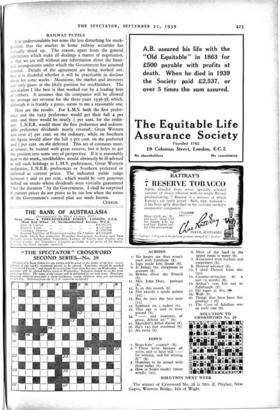RAILWAY PUZZLE
It is understandable but none the less disturbing for stock- holders that the market in home railway securities has virtlially dried up. The reason, apart from the general inhibitions which make all dealings a matter of negotiation, is that we are still without any information about the finan- cial arrangements under which the Government has assumed control. Details of the agreement are being worked out, but it is doubtful whether it will be practicable to disclose them for some weeks. Meantime, the market and investors can only guess at the likely position for stockholders. The calculation I like best is that worked out by a leading firm of jobbers. It assumes that the companies will be allowed the average net revenue for the three years 1936-38, which, although it is frankly a guess, seems to me a reasonable one.
Here are the results. For L.M.S. both the first prefer- ence and the 1923 preference would get their full 4 per cent. and there would be nearly I per cent. for the ordin- ary. L.N.E.R. would show the first preference and redeem- able preference dividends nearly covered; Great Western just over 2j per cent. on the ordinary; while on Southern the figure would allow the full 5 per cent. on the preferred and I per cent. on the deferred. This set of estimates must, of course, be treated with great reserve, but it helps to get the position into some sort of perspective. If it is reasonably near to the mark„ stockholders would obviously be ill-advised to sell such holdings as L.M.S. preferences, Great Western ordinaries, L.N.E.R. preferences or Southern preferred or deferred at current prices. The indicated yields range between 7 and io per cent., which would be very generous indeed on stocks whose dividends were virtually guaranteed " for the duration " by the Government. I shall be surprised if current prices do not prove to be too low when the terms of the Government's control plan are made known.
CUSTOS.


































 Previous page
Previous page